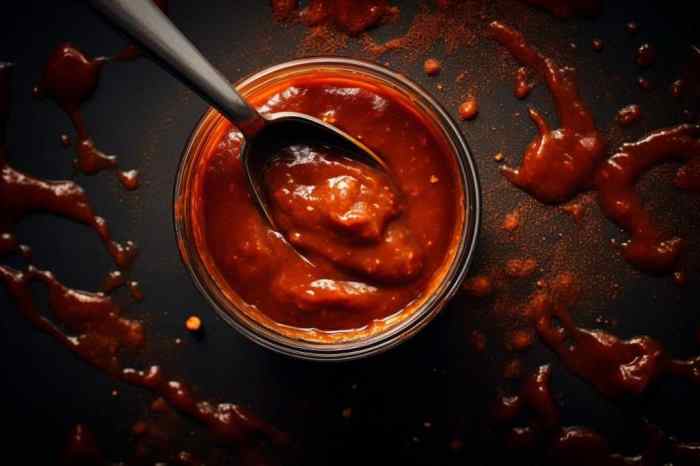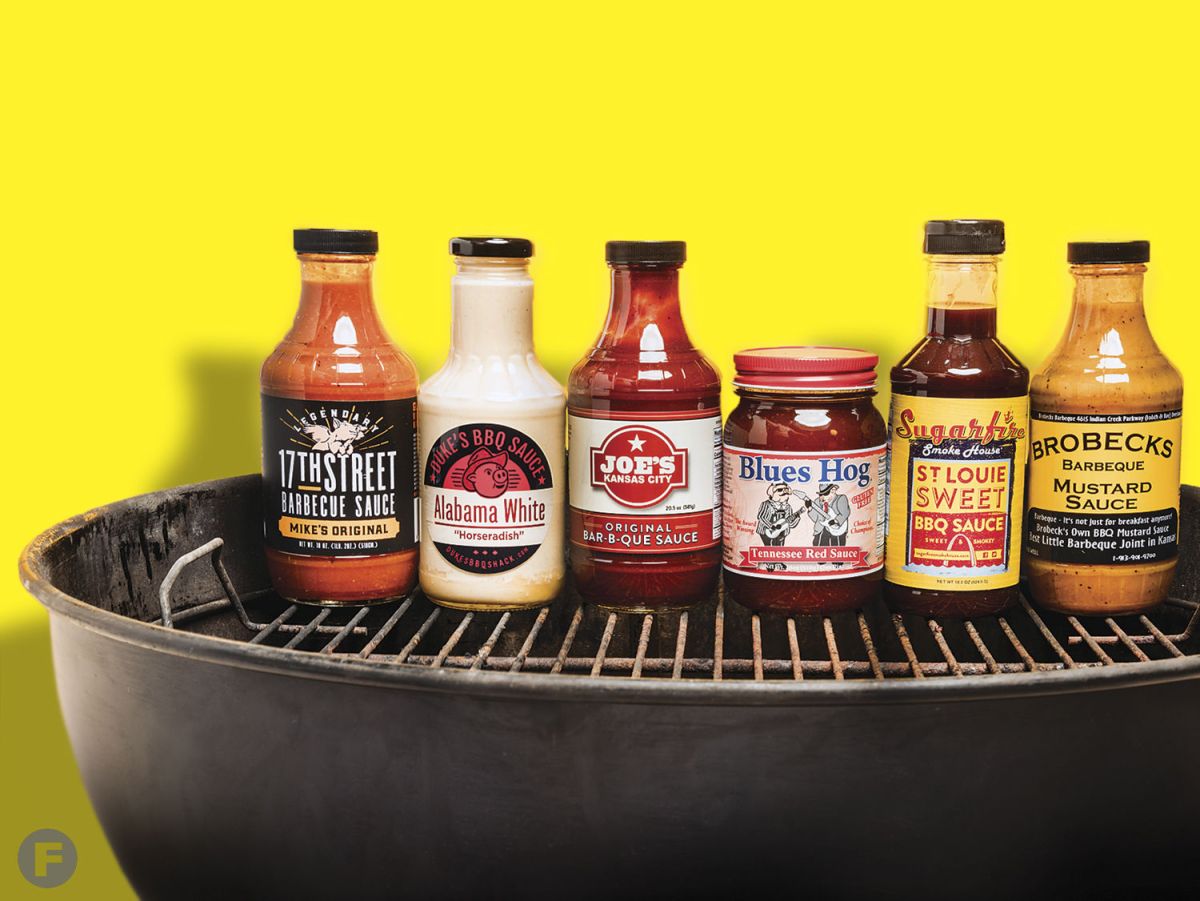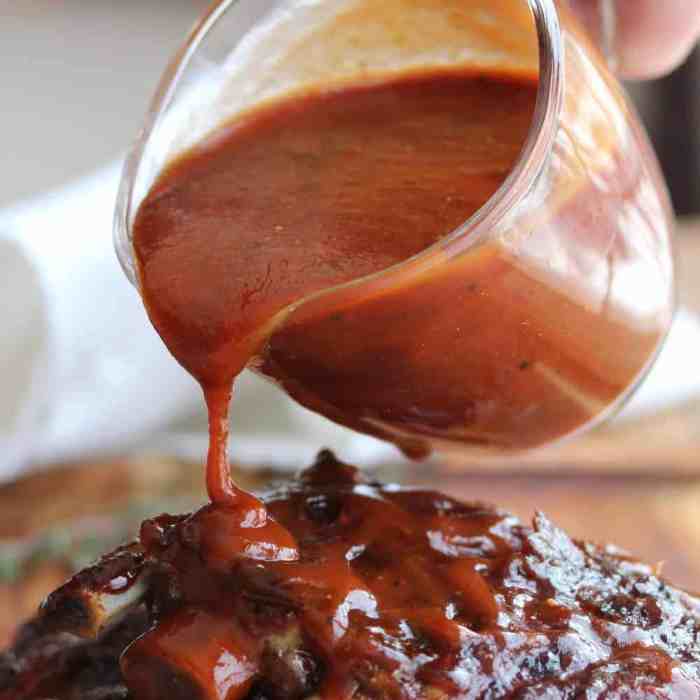Carnivore BBQ Sauce Recipe A Primal Flavor
Carnivore BBQ Sauce: A Flavor Exploration

Source: meateatingmilitaryman.com
Carnivore bbq sauce recipe – The carnivore diet, focusing solely on animal products, presents unique culinary challenges and opportunities. While eliminating common BBQ sauce ingredients like tomatoes and sugar initially seems limiting, it opens doors to a world of rich, savory flavors derived entirely from meat and animal fats. This exploration delves into crafting a delicious and nutritionally dense carnivore-friendly BBQ sauce, exploring flavor profiles, ingredient choices, and creative application.
A carnivore BBQ sauce recipe often focuses on rich, savory flavors derived from meat and fat. For a more refined approach, consider incorporating elements from elegant sauces, such as those found in this collection of beef tenderloin sauces recipes , to elevate your carnivore BBQ sauce. The subtle nuances of a sophisticated sauce can beautifully complement the boldness of a carnivore-style BBQ.
The Carnivore Diet’s Impact on Flavor Preferences
Carnivore-friendly foods typically feature bold, savory flavors. Rich umami notes from organ meats, the inherent fattiness of meats like beef and lamb, and the subtle minerality of bone broths dominate. These robust flavors require a BBQ sauce that complements rather than competes. The challenge lies in achieving a balanced, complex taste profile without relying on traditional sweeteners or acidic elements like tomatoes, which are staples in conventional BBQ sauces.
This necessitates innovative techniques for achieving sweetness, acidity, and depth.
Ingredient Exploration for a Carnivore BBQ Sauce

Source: townnews.com
Several ingredients provide a strong foundation for a carnivore BBQ sauce. The choice of base significantly influences the final product’s flavor and texture.
- Beef Tallow: Provides a rich, beefy flavor and a smooth, creamy texture.
- Duck Fat: Offers a more intense, slightly gamey flavor with a slightly crispier texture compared to beef tallow.
- Bone Broth: Adds depth of flavor and a gelatinous texture, thickening the sauce naturally.
- Rendered Chicken Fat: Offers a milder, cleaner flavor profile than beef or duck fat, providing a lighter base.
- Suet (Beef Kidney Fat): A strong, rich, and slightly gamey flavor with a firm texture that can be used sparingly to add intensity.
Animal fats differ significantly. Beef tallow lends a classic, beefy taste, while duck fat contributes a more intense, slightly gamey note. The choice depends on the desired flavor profile.
| Ingredient | Fat (g/100g) | Protein (g/100g) | Calories (kcal/100g) |
|---|---|---|---|
| Beef Tallow | ~99 | 0-1 | ~900 |
| Duck Fat | ~99 | 0-1 | ~900 |
| Bone Broth (approx.) | ~1-5 | ~8-12 | ~15-40 |
| Rendered Chicken Fat | ~99 | 0-1 | ~900 |
| Suet | ~95 | <1 | ~860 |
Flavor Balancing and Enhancement Techniques, Carnivore bbq sauce recipe

Source: howtofeedaloon.com
Achieving a balanced flavor profile in a carnivore BBQ sauce requires creative substitutions for traditional ingredients.
- Sweetness without Sugar:
- Monk Fruit Extract/Erythritol: These sugar alcohols provide sweetness without impacting blood sugar levels significantly. They have a slightly different taste profile than sugar, which might require adjustments in the overall recipe.
- Stevia: A natural, plant-based sweetener, stevia offers intense sweetness, but can have a slightly bitter aftertaste if not used carefully.
- Caramelized Onions (or other allowed vegetables): These can be added in very small quantities to provide a slightly sweet and savory note. This is only suitable if the carnivore diet permits small amounts of such ingredients.
- Umami Enhancement:
- Anchovy Paste: A potent source of umami, a small amount adds significant depth without overpowering other flavors.
- Beef Liver Pâté: Adds a rich, earthy umami and a smooth texture.
- Mushroom Extract (if permitted): Though not strictly animal-based, some carnivore interpretations allow for certain mushroom extracts. These offer intense umami notes.
- Smoky Flavor Profile:
- Smoked Bacon Fat: Rendering bacon fat adds a smoky flavor directly to the base of the sauce.
- Liquid Smoke (carefully): A few drops of high-quality liquid smoke can provide a smoky essence; however, it’s crucial to use it sparingly as an overpowering smoky flavor can mask the other components of the sauce.
- Charred Bone Marrow: Adding a small amount of charred bone marrow can introduce a smoky depth to the sauce. This will only work well with certain bone types and careful preparation.
Recipe Development and Variation
This recipe provides a foundation for creating a delicious carnivore BBQ sauce. Variations allow for personalized flavor profiles.
- Basic Carnivore BBQ Sauce:
- 1 cup beef tallow
- 1/4 cup bone broth
- 2 tablespoons anchovy paste
- 1 tablespoon smoked paprika
- 1 teaspoon garlic powder
- 1/2 teaspoon black pepper
- 1/4 teaspoon onion powder
- 1/4 teaspoon cayenne pepper (optional)
- 1-2 teaspoons monk fruit extract (or to taste)
- Melt beef tallow in a saucepan over medium heat.
- Add bone broth, anchovy paste, paprika, garlic powder, pepper, onion powder, and cayenne pepper (if using). Stir well.
- Simmer for 15-20 minutes, stirring occasionally, until the sauce has thickened slightly.
- Remove from heat and stir in monk fruit extract to taste.
- Variations:
- Spicy: Increase cayenne pepper to 1-2 teaspoons or add a pinch of chili flakes.
- Savory: Substitute duck fat for beef tallow and add a tablespoon of beef liver pâté.
- Tangy: Add a tablespoon of apple cider vinegar (if permitted within the carnivore diet) and reduce the amount of monk fruit extract.
Visual Representation and Sensory Description
The ideal carnivore BBQ sauce has a rich, dark brown color, almost mahogany in its depth. The consistency should be thick enough to coat meat without being overly viscous; a smooth, pourable texture is ideal. The aroma is complex, blending savory notes of beef and anchovy with a hint of smoke and a subtle sweetness. The taste is a balanced interplay of umami richness, subtle sweetness, and a pleasant warmth from spices.
The smoky notes linger on the palate, leaving a satisfying savory finish.
Application and Serving Suggestions
This sauce pairs exceptionally well with various meats, enhancing their flavors and adding a delicious glaze.
- Steak: The rich sauce complements the savory notes of a well-grilled steak, creating a luxurious combination.
- Pork Ribs: The sauce’s thickness adheres well to the ribs, providing a flavorful coating and enhancing the smoky taste of the meat.
- Chicken Thighs: The sauce adds moisture and richness to chicken thighs, balancing their leaner profile.
Apply the sauce during the last few minutes of grilling to prevent burning. For optimal results, brush the sauce onto the meat repeatedly, allowing it to caramelize slightly. Beyond grilling, consider using the sauce as a dipping sauce for meat skewers or incorporating it into a carnivore-friendly meatloaf for added depth of flavor.
General Inquiries: Carnivore Bbq Sauce Recipe
Can I use other types of animal fat besides beef tallow and duck fat?
Yes, lard, chicken fat, and even rendered bone marrow can be explored as base ingredients. Their flavor profiles will vary, influencing the final taste of the sauce.
How long will the carnivore BBQ sauce last?
Properly stored in an airtight container in the refrigerator, the sauce should last for approximately one week. Freezing is also an option for longer storage.
Can I adjust the spice level?
Absolutely! The recipes provided offer starting points. Feel free to adjust the amount of chili flakes or other spices to achieve your preferred level of heat.
Are there any substitutes for the bone broth?
While bone broth adds significant depth of flavor, you can experiment with other meat-based broths or even a small amount of highly concentrated meat juices for a similar effect. However, note that the flavor profile may change.





















